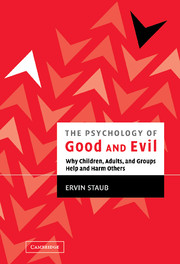Book contents
- Frontmatter
- Contents
- Preface
- Acknowledgments
- PART I INTRODUCTION AND CORE CONCEPTS
- PART II THE ROOTS OF HELPING OTHER PEOPLE IN NEED IN CONTRAST TO PASSIVITY
- PART III HOW CHILDREN BECOME CARING AND HELPFUL RATHER THAN HOSTILE AND AGGRESSIVE
- PART IV THE ORIGINS OF GENOCIDE, MASS KILLING, AND OTHER COLLECTIVE VIOLENCE
- PART V THE AFTERMATH OF MASS VIOLENCE: TRAUMA, HEALING, PREVENTION, AND RECONCILIATION
- PART VI CREATING CARING, MORALLY INCLUSIVE, PEACEFUL SOCIETIES
- 44 Changing Cultures and Society
- 45 Transforming the Bystanders: Altruism, Caring, and Social Responsibility
- 46 Blind versus Constructive Patriotism: Moving from Embeddedness in the Group to Critical Loyalty and Action
- 47 Manifestations of Blind and Constructive Patriotism: Summary of Findings
- 48 The Ideal University in the Real World
- 49 Conclusion: Creating Caring Societies
- Appendix: What Are Your Values and Goals?
- Index
- References
46 - Blind versus Constructive Patriotism: Moving from Embeddedness in the Group to Critical Loyalty and Action
Published online by Cambridge University Press: 07 May 2010
- Frontmatter
- Contents
- Preface
- Acknowledgments
- PART I INTRODUCTION AND CORE CONCEPTS
- PART II THE ROOTS OF HELPING OTHER PEOPLE IN NEED IN CONTRAST TO PASSIVITY
- PART III HOW CHILDREN BECOME CARING AND HELPFUL RATHER THAN HOSTILE AND AGGRESSIVE
- PART IV THE ORIGINS OF GENOCIDE, MASS KILLING, AND OTHER COLLECTIVE VIOLENCE
- PART V THE AFTERMATH OF MASS VIOLENCE: TRAUMA, HEALING, PREVENTION, AND RECONCILIATION
- PART VI CREATING CARING, MORALLY INCLUSIVE, PEACEFUL SOCIETIES
- 44 Changing Cultures and Society
- 45 Transforming the Bystanders: Altruism, Caring, and Social Responsibility
- 46 Blind versus Constructive Patriotism: Moving from Embeddedness in the Group to Critical Loyalty and Action
- 47 Manifestations of Blind and Constructive Patriotism: Summary of Findings
- 48 The Ideal University in the Real World
- 49 Conclusion: Creating Caring Societies
- Appendix: What Are Your Values and Goals?
- Index
- References
Summary
We constantly see in the world what may be called blind patriotism: an intense alignment by people with their nation or group and uncritical acceptance of and support for its policies and practices, with an absence of moral consideration of their consequences or disregard of their impact on the welfare of human beings who are outside the group or are members of its subgroups. There is celebration of any apparent gain by the group regardless of the means by which it is achieved, a tendency to act in the spirit of the dictum “my country right or wrong.” Blind patriotism often has destructive consequences not only for other groups, but ultimately for one's own group as well. What are its origins, and might there be desirable, ideal, or “constructive” forms of patriotism?
When a government or a dominant group in society embarks on a destructive course of action that may ultimately lead to mass killing, genocide, or war, reactions by the population have the potential to inhibit the evolution of greater destructiveness (Staub, 1989). But usually the “bystanders,” members of the population who are not directly involved as either perpetrators or victims, remain passive. In part, this is due to blind patriotism, which leads to loyalty to the group regardless of the nature of its conduct, or at least creates an embeddedness in the group that makes it difficult to oppose its direction.
- Type
- Chapter
- Information
- The Psychology of Good and EvilWhy Children, Adults, and Groups Help and Harm Others, pp. 497 - 512Publisher: Cambridge University PressPrint publication year: 2003
References
- 7
- Cited by



